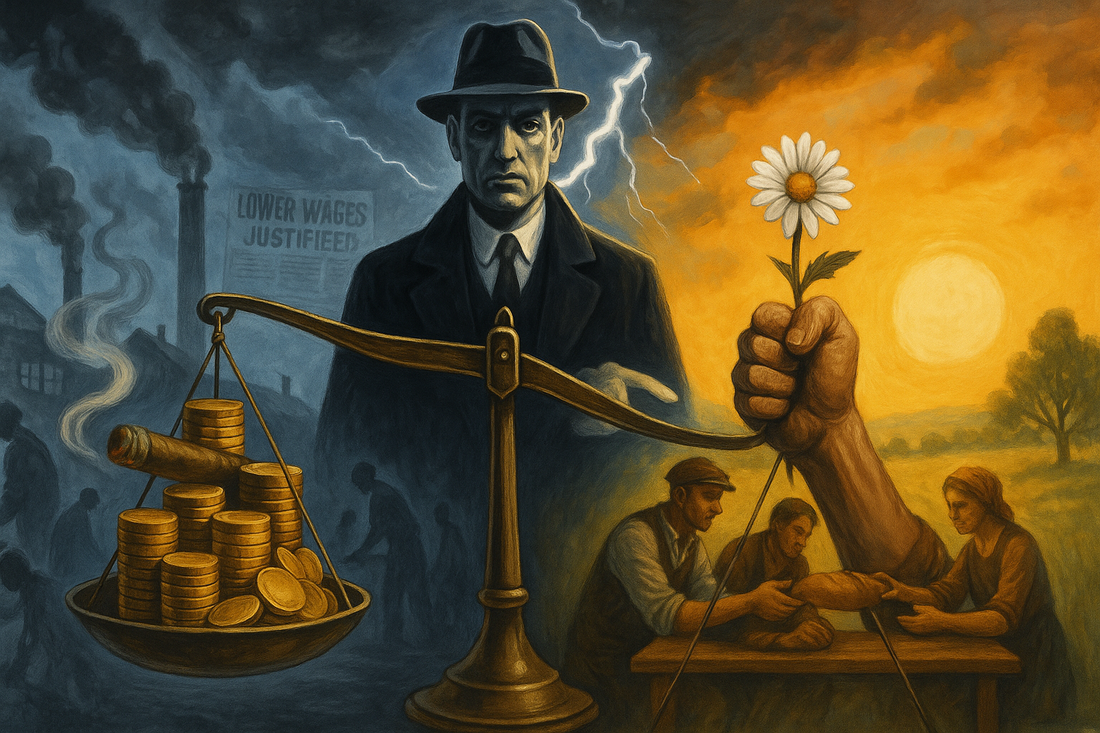
Capitalism vs. Socialism in An Inspector Calls
Jason PerinbamShare
Trying to understand the clash between Capitalism and Socialism in An Inspector Calls? You’re not alone. This page breaks down how Priestley uses key characters, quotes, and events to present his powerful political message—and shows you how to write top-grade analysis for your GCSE exam. For full theme breakdowns, Grade 9 essays, and over 50 high-level quotes, check out our bestselling An Inspector Calls Cheat Sheet.
Why Is This Theme So Important?
At its core, An Inspector Calls is a political play. J.B. Priestley, a passionate socialist, uses the characters to challenge capitalist values and promote a more equitable, collective society.
By setting the play in 1912—before two world wars and the rise of the welfare state—Priestley exposes the flaws of unregulated capitalism and warns what happens when the wealthy ignore their social responsibilities.
Quick Definitions
Capitalism – An economic system based on private ownership, competition, and individual profit. Often linked to inequality and exploitation.
Socialism – A belief in shared ownership, equality, and collective responsibility. Promotes fairness and the protection of the vulnerable.
Who Represents What?
| Character | Represents | Ideological Traits |
| Mr Birling | Capitalism | Greedy, selfish, profit-obsessed, dismissive of workers |
| Mrs Birling |
Capitalism |
Elitist, patronising, believes the poor are morally inferior |
| Gerald Croft | Capitalism (with a social mask) | Uses power for personal gain while pretending to care |
| Sheila Birling | Transitioning | Becomes more socially conscious and aware of privilege |
| Eric Birling | Socialist-leaning | Learns from mistakes and accepts responsibility |
| Inspector Goole | Socialism | Advocates for collective responsibility, equality, and compassion |
| Eva Smith | Victim of Capitalism | Represents the working class exploited by the system |
Key Moments of Conflict
Mr Birling: Capitalist Soundbites
- “A man has to mind his own business and look after himself and his own.”
▶ This line captures the individualistic, self-serving nature of capitalism. The fact that he is interrupted by the Inspector’s entrance symbolises how socialism will challenge this view.
Inspector Goole: Priestley’s Socialist Voice
- “We are members of one body. We are responsible for each other.”
▶ This is the heart of the play’s message. The Inspector’s tone is almost sermon-like, reinforcing Priestley’s call for social solidarity and moral duty.
Birling’s View of Workers
- “If you don’t come down sharply on these people, they’d soon be asking for the earth.”
▶ He sees workers like Eva Smith as threats, not people. This shows how capitalism dehumanises the working class and treats demands for fair pay as unreasonable.
Dramatic Irony & Capitalist Arrogance
-
“The Titanic – she sails next week – unsinkable, absolutely unsinkable.”
▶ Birling’s false confidence reflects the flawed logic of capitalism—proud, overconfident, and blind to reality. Priestley uses dramatic irony to mock the capitalist elite.
Grade 9 Vocabulary for This Theme
Use these powerful terms to elevate your analysis:
- Exploitative – Taking unfair advantage of others for personal gain
- Inequitable – Unfair or unjust distribution of wealth/power
- Self-serving – Acting in your own interests, without care for others
- Collectivist – Prioritising the needs of the group over the individual
- Distributive justice – Fair distribution of resources and opportunities
- Social solidarity – Unity based on shared goals and responsibilities
- Elitist – Favouring or maintaining power for a privileged few
Priestley’s Purpose
Priestley’s aim was clear:
- Critique the selfishness of capitalism
- Promote social reform and collective action
After two world wars and the rise of socialism in Britain, Priestley believed that a fairer society was possible, but only if people took responsibility for one another.
- The play acts as a warning: without compassion, society is doomed to repeat its mistakes.
Linking to Context (Exam Tip!)
- 1945 (when the play was written): Britain was recovering from WWII and moving towards socialism (e.g., the NHS and welfare state).
- 1912 (when the play is set): An unequal, capitalist society dominated by the wealthy—ripe for Priestley’s critique.
Linking this contrast in your essay shows top-level contextual awareness.
Want Full Analysis, Exemplar Paragraphs & More Quotes?
This is just a snippet of our An Inspector Calls Themes Cheat Sheet, which includes:
✅ Deep character profiles (Birling, Sheila, Inspector, and more)
✅ Grade 9 essay examples with examiner annotations
✅ Theme breakdowns + key context to boost your analysis
✅ 50+ premium quotes with advanced analysis
🚀 Upgrade your revision—download the full guide now!
P.S. Struggling with analysis or quotes? Our text-specific cheat sheets break down An Inspector Calls, A Christmas Carol, and more into Grade 9-ready notes.
Why JP Tutors Hub?
Founded by a straight-A student, our resources are:
✨ Exam-board aligned
✨ Used by thousands of GCSE students
✨ Designed to save you time and boost marks
Follow us for more free tips—or visit our shop to upgrade your revision! 🚀